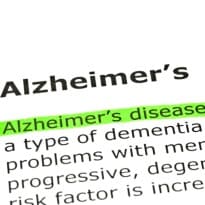


Consuming food items rich in omega-3 may raise blood flow to areas in the brain associated with memory and learning, thus reducing the risk of Alzheimer's disease.

Alzheimer's is the most common form of dementia, in which the mental ability of a person declines and gradually reaches a stage where it becomes difficult for them to lead a normal life. It is ...

A new study links low levels of vitamin D with faster decline in cognitive functions among older adults, thereby putting them at greater risk for Alzheimer's disease.

An Indian researcher is currently using electroencephalogram (EEG) and auditory feedback to determine how Alzheimer's patients respond to various speech tasks, and if their responses differ from those of Parkinson's patients.

Researchers say vitamin E might slow the progression of mild-to-moderate Alzheimer's disease -- the first time any treatment has been shown to alter the course of dementia at that stage.In a study of more than ...

A healthy cholesterol pattern - high levels of good cholesterol and low levels of bad cholesterol - is the key to keep Alzheimer's disease at bay, scientists have found. Researchers at University of California, Davis ...

A new research reveals that a stress-coping hormone released by the brain has side effects which may lead to Alzheimer's disease.

A recent study has found that women with a gene variant associated with Alzheimer's disease experience a steeper decline in body mass index (BMI) after the age 70.

Many Alzheimer's patients first experience mild cognitive impairment - a pre-dementia condition that significantly increases the risk of developing Alzheimer's in the following months or years.

Alzheimer's is a progressive disease which means that symptoms appear gradually over time as the disease becomes severe but a new gene that has been recently discovered may help predict your risk of contracting Alzheimer's.